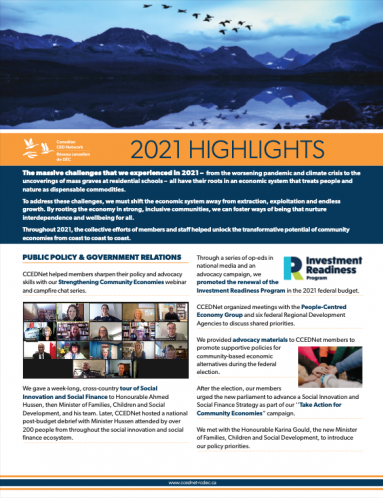
The massive challenges that we experienced in 2021 – from the worsening pandemic and climate crisis to the uncoverings of mass graves at residential schools – all have their roots in an economic system that treats people and nature as dispensable commodities.
To address these challenges, we must shift the economic system away from extraction, exploitation and endless growth. By anchoring the economy in strong, inclusive communities, we can foster ways of being that nurture interdependence and wellbeing for all.
Throughout 2021, the collective efforts of members and staff helped unlock the transformative potential of community economies from coast to coast to coast.
Public Policy & Government Relations
- CCEDNet helped members sharpen their policy and advocacy skills with our Strengthening Community Economies webinar and campfire chat series.
- We gave a week-long, cross-country tour of Social Innovation and Social Finance to Honourable Ahmed Hussen, then Minister of Families, Children and Social Development, and his team. Later, CCEDNet hosted a national post-budget debrief with Minister Hussen attended by over 200 people from throughout the social innovation and social finance ecosystem.
- Through a series of op-eds in national media and an advocacy campaign, we promoted the renewal of the Investment Readiness Program in the 2021 federal budget.
- CCEDNet organized meetings with the People-Centred Economy Group and six federal Regional Development Agencies to discuss shared priorities.
- We provided advocacy materials to CCEDNet members to promote supportive policies for community-based economic alternatives during the federal election.
- Our members urged the new parliament to advance a Social Innovation and Social Finance Strategy as part of our ‘‘Take Action for Community Economies’ campaign.
- We met with the Honourable Karina Gould, the new Minister of Families, Children and Social Development, to introduce our policy priorities.
- CCEDNet contributed to peer-learning partnerships on internationalization and legal frameworks for the social solidarity economy as part of the OECD Global Action promoting social and solidarity economy ecosystems.
Learning & Capacity Building
- Social Enterprise Ecosystem Project (S4ES)
- In September 2021, after five years of helping Canadian social enterprises build vital capacity, S4ES wrapped up its activities. Throughout the year, the S4ES partners – Buy Social Canada, CCEDNet, the Chantier de l’économie sociale, Social Enterprise Institute, and Social Value Lab – ran incubators, launched courses, distributed resources, and energized communities of support.
- S4ES Loan Fund, administered by CCEDNet and managed by six fund managers across Canada, completed disbursements of $800,000 in 2021 to 33 social enterprises. The access to social finance allowed those social enterprises to either launch or grow their business and created 168 jobs and volunteer positions.
- External Learning Programs
- CCEDNet designed a Social Innovation Anti-Masterclass, and piloted a delivery of the curriculum to five cohorts of learners across five regions of the country.
- We successfully pivoted the in-person Community Leadership Program to a virtual format, completing program delivery with two different organizations. Overall, 93% of learners indicated the training was very effective, 97% of learners would recommend the training to a friend or colleague, and 100% of the learners who moved through the program said they used the learning in their roles (90% of whom felt they would use it often or every day!)
- We made preparations for the Toward Co-operative Commonwealth massive open on-line course in partnership with Synergia Co-operative Institute and Athabasca University.
- CCEDNet participated in a video series on Bill Ninacs, solidarity development activist.
- Internal Learning
- We facilitated staff through monthly anti-oppression and collective liberation learning sessions, including self-guided study and small group work on how white supremacy culture operates within organizations. Joint Board and staff sessions considered intersectionality, and CCEDNet remained an active participant of the Solidarity Working Group.
- Research, Data, and Impact Measurement
- CCEDNet began work on communities of practice as part of the Adopting Common Measures project to strengthen social impact measurement for the Sustainable Development Goals in partnership with the Centre for Social Innovation and the Common Approach to Impact Measurement.
- We completed final surveys for a longitudinal study on the impacts of Work Integration Social Enterprises for vulnerable populations at risk of homelessness.
- CCEDNet’s Community Data Program added a pandemic Community Recovery Dashboard and a Housing Dashboard to the suite of datasets available to local communities throughout Canada.
- Member Engagement
- We engaged our members in the process of finalizing the Theory of Change document and began tracking our progress through the second half of the year. We also developed a member-wide annual survey to better learn how we can best support our collective efforts to build stronger communities.
- At the 2021 AGM, we hosted the third annual Stronger Together Awards, celebrating the contributions that West Central Women’s Resource Centre (WCWRC), Fireweed Food Co-op, Rosalind Lockyer of PARO Centre for Women’s Enterprise, Wendy Keats of Co-operative Enterprise Council of New Brunswick & Bill Ninacs of Coopérative La Clé have made to our network and to CED.
- CreateAction
- In partnership with the National Association of Friendship Centres (NAFC) and the Social Research and Demonstration Corporation (SRDC), we hosted the first and second cohorts of CreateAction. Through the program, we helped support 50 community organizations (including 12 Friendship Centres) to recruit and employ 55 young people facing barriers to employment for six-months of practical work experience.
- We ran multifaceted learning and support programs that helped both employers and youth advance personal and professional development goals. Along with our partners, we also helped develop vital resources for long-term learning such as an Anti-Oppression backgrounder.
Communications
- We engaged staff, Board, and network members in the planning process for a complete overhaul of CCEDNet’s website. In collaboration with Relish, a B Corp based in Winnipeg, we then dove into the intensive process of designing a new website. We’re thrilled that our new site will be launching in summer 2022!
- We sent out four member communiques, packed with information and resources from across our network, shining a light on the wonderful work that members are doing.
- Through our national newsletters, we shared CED insights, jobs, and events with more than 3,000 subscribers on a bi-monthly basis. And we used our social media feeds to amplify our advocacy campaigns, boost member visibility, distribute news and resources, and share learnings from our events.
Regional Projects
- Regional ecosystem development
- As part of our ESDC Investment Readiness Program role, we elevated community investment organization models in social finance by convening a pan-Canadian community of practice, as well as Western and Atlantic learning communities, and adapting the BC Community Investment Co-op Startup and Operations Guide for Alberta, New Brunswick, Nova Scotia and PEI.
- With the Cooperation Council of Ontario and support from the Ontario Trillium Foundation, we published a report on the status and prospects for new Community Investment strategies in Ontario and an Ontario Community Investment Co-op Startup Guide.
- We partnered with Cooperative Enterprise Council of New Brunswick to release a report detailing the economic impact of Nova Scotia’s Community Economic Development Investment Fund (CEDIF) model.
- We partnered with Flourish Community Development Co-op (formerly Leading Edge), Co-operative Enterprise Council of New Brunswick, and CDR-Acadie to complete an action research project detailing the social succession opportunity in Atlantic Canada.
- We worked with the BC Co-operative Association to convene two broad social economy ecosystem building events.
- We continue to sit on the Ontario Social Economy Roundtable steering committee and with them supported one broad ecosystem building meeting in Ontario.
- We continue to participate in the Alberta SEED steering committee, and extended our commitment by agreeing to provide ongoing administrative and financial management support to this collective. Alberta SEED also secured support from the Alberta Civil Society Fund, forged a new partnership with Creative Partnerships in the Government of Alberta, and hosted a Reconvene event bringing the Alberta social economy ecosystem together.
- We were invited to join an advisory group for the Healthy Communities Initiative, advocating for strong diversity and inclusion measures and partnerships to reach rural regions with this federal program working to transform public spaces in response to COVID-19.
- We worked with a research mapper and authored chapters covering Manitoba and Saskatchewan as well as Grassroots models in the State of Social Finance in Canada report and interactive sector map released by the Table of Impact Investment Practitioners.
- Spark
- In addition to its pro bono matchmaking work, the Spark team took on the social enterprise development services previously provided under CCEDNet-Manitoba’s Social Enterprise Manitoba program, supporting local non-profit organizations who are exploring, developing, or currently operating social enterprises and revenue-generating activities.
- In 2021, 100% of organizations surveyed said they would recommend the Spark volunteer with whom they were matched.
- CCEDNet-Manitoba
- The CCEDNet MB team held a successful virtual member meeting in May, facilitated 165 meetings with members, stakeholders, and community members; responded to 110 information brokering requests; led 16 external presentations to almost 1,000 participants; engaged municipal, provincial, and regional governments through 70 meetings and 20 submissions, and supported six policy and member coalitions.
- The Manitoba team successfully advocated for the adoption of Winnipeg’s first-ever Poverty Reduction Strategy through the Make Poverty History Manitoba coalition and as a member of the City’s Core Working Group. Additionally, the team successfully advocated for the adoption of Winnipeg’s Social & Sustainable Procurement Framework and participated in a city-led working group.
- Almost 250 participants attended the Manitoba Gathering, which the team hosted virtually over the course of 3 days. 99% of attendees reported an increase in knowledge from the workshops they attended.
- The team engaged 102 participants in two workshops on Social Enterprise for Nonprofits and Creating Accessible Employment. Also, CCEDNet MB coordinated a group of capacity-building organizations that provide learning and training opportunities to community-based organizations and social economy enterprises.





